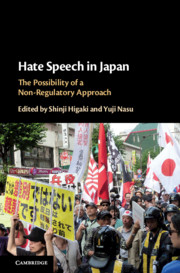21 results
Appendix B - Lists of Japanese Acts, Bills, Ordinances, and Other Materials
-
- Book:
- Hate Speech in Japan
- Published online:
- 15 January 2021
- Print publication:
- 28 January 2021, pp 489-496
-
- Chapter
- Export citation
Abbreviations
-
- Book:
- Hate Speech in Japan
- Published online:
- 15 January 2021
- Print publication:
- 28 January 2021, pp xvii-xviii
-
- Chapter
- Export citation
Tables
-
- Book:
- Hate Speech in Japan
- Published online:
- 15 January 2021
- Print publication:
- 28 January 2021, pp viii-viii
-
- Chapter
- Export citation
Index
-
- Book:
- Hate Speech in Japan
- Published online:
- 15 January 2021
- Print publication:
- 28 January 2021, pp 497-506
-
- Chapter
- Export citation
Figures
-
- Book:
- Hate Speech in Japan
- Published online:
- 15 January 2021
- Print publication:
- 28 January 2021, pp ix-ix
-
- Chapter
- Export citation
Appendices
-
- Book:
- Hate Speech in Japan
- Published online:
- 15 January 2021
- Print publication:
- 28 January 2021, pp 474-496
-
- Chapter
- Export citation
19 - Hate Groups and the Use of Public Facilities
- from Part VI - Current Issues
-
-
- Book:
- Hate Speech in Japan
- Published online:
- 15 January 2021
- Print publication:
- 28 January 2021, pp 425-455
-
- Chapter
- Export citation
Acknowledgements
-
- Book:
- Hate Speech in Japan
- Published online:
- 15 January 2021
- Print publication:
- 28 January 2021, pp xv-xvi
-
- Chapter
- Export citation
Part VI - Current Issues
-
- Book:
- Hate Speech in Japan
- Published online:
- 15 January 2021
- Print publication:
- 28 January 2021, pp 407-473
-
- Chapter
- Export citation
Appendix A - A Chronology of Events and Legislation Related to Hate Speech in Japan
-
- Book:
- Hate Speech in Japan
- Published online:
- 15 January 2021
- Print publication:
- 28 January 2021, pp 474-488
-
- Chapter
- Export citation
Introduction
-
-
- Book:
- Hate Speech in Japan
- Published online:
- 15 January 2021
- Print publication:
- 28 January 2021, pp 1-14
-
- Chapter
- Export citation
Contributors
-
- Book:
- Hate Speech in Japan
- Published online:
- 15 January 2021
- Print publication:
- 28 January 2021, pp x-xiv
-
- Chapter
- Export citation
Part V - Multidisciplinary Debates
-
- Book:
- Hate Speech in Japan
- Published online:
- 15 January 2021
- Print publication:
- 28 January 2021, pp 339-406
-
- Chapter
- Export citation
Part II - History
-
- Book:
- Hate Speech in Japan
- Published online:
- 15 January 2021
- Print publication:
- 28 January 2021, pp 105-164
-
- Chapter
- Export citation
Part III - Legal Framework
-
- Book:
- Hate Speech in Japan
- Published online:
- 15 January 2021
- Print publication:
- 28 January 2021, pp 165-254
-
- Chapter
- Export citation
Part I - Outline
-
- Book:
- Hate Speech in Japan
- Published online:
- 15 January 2021
- Print publication:
- 28 January 2021, pp 15-104
-
- Chapter
- Export citation
Part IV - Cases
-
- Book:
- Hate Speech in Japan
- Published online:
- 15 January 2021
- Print publication:
- 28 January 2021, pp 255-338
-
- Chapter
- Export citation
Copyright page
-
- Book:
- Hate Speech in Japan
- Published online:
- 15 January 2021
- Print publication:
- 28 January 2021, pp iv-iv
-
- Chapter
- Export citation
Contents
-
- Book:
- Hate Speech in Japan
- Published online:
- 15 January 2021
- Print publication:
- 28 January 2021, pp v-vii
-
- Chapter
- Export citation

Hate Speech in Japan
- The Possibility of a Non-Regulatory Approach
-
- Published online:
- 15 January 2021
- Print publication:
- 28 January 2021



